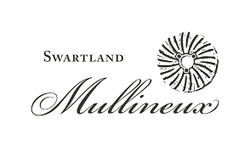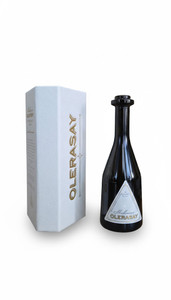Mullineux is the Swartland winery of Mullineux & Leeu Family Wines.
Having worked several vintages at wineries in France, South Africa and California, Chris & Andrea chose to settle in the Swartland region of the Western Cape Winelands , firmly believing that the ancient granite and schist based terroirs and old vineyards of this region have the potential to produce truly great wine.
Within a very short time the winery established itself as one of South Africa’s most celebrated wine brands, both locally and on the international front. By 2023 the winery had received over fifty 5-star ratings from Platter’s South African Wine Guide, as well as being awarded Platter’s Winery of the Year an unprecedented five times in 2023, 2020, 2019, 2016 and 2014.
In addition, Andrea was named Wine Enthusiast’s 2016 International Winemaker of the Year and in 2016 Chris & Andrea were Tim Atkin’s South African Winemakers of the Year.
The name Mullineux originates from ‘Watermill’ in French, which is represented by the millstone emblem as part of the design of the Mullineux Swartland logo. This further links Mullineux to the Swartland, which is known as the ‘bread-basket’ of South Africa due to its beautiful wheat fields.
Our vineyards at Roundstone are Certified Organic with Ecocert and are in conversion to becoming Regenerative Organic Certified (ROC). In practice, regenerative organic agriculture is a combination of crop rotation, low- to no-till compost, cropping, and zero use of persistent chemical pesticides and fertilizers . In applying the pillars of regenerative organic farming, we aim to increase the quality and complexity of our wines as well as the sustainability of our wine business. As we sequester carbon into our soils, we increase their water holding capacities and prevent both evaporation and erosion.
By not using synthetic fertilizers or pesticides and following minimal tilling practices, the increased life and diversity in our soils yield more healthy and balanced grapes that help us make better wines that truly speak of place.
And, as we work to improve the lives of our farm workers through WIETA and Fair For Life (FFL) certification as well as Great Heart Wines, our staff-owned wine company, we ultimately help ensure the health and social sustainability of employees and their communities.
We work with cover crops, mulches, and composts and plant corridors of Fynbos in our vineyards, the natural vegetation of the Western Cape. These elements keep the soil in natural balance and encourage water retention and beneficial insects in the area. In the winery we add no enzymes, tannins, acids, or other winemaking chemicals, other than minimal amounts of S02 (Sulfur dioxide). Each winery is Integrated Production of Wine (IPW) certified, which requires it to follow the scheme’s best practice guidelines in terms of energy use, cleaning practices and care for the environment.
The cellar effluent is processed via an eco-friendly stone labyrinth in a wetland on Roundstone farm. Lees are collected for being sent to be transformed into value-added natural products that are used in the wine and pharmaceutical industries and other markets and grape skins are sent to make compost. Other waste, for example glass, paper, and tin, is also recycled.























